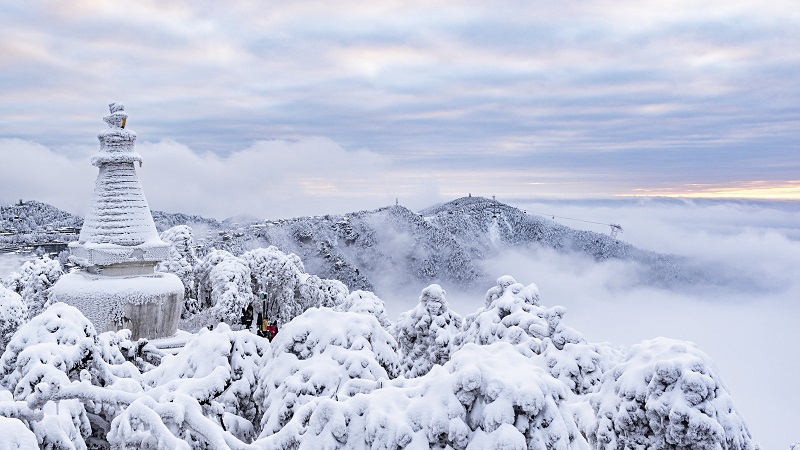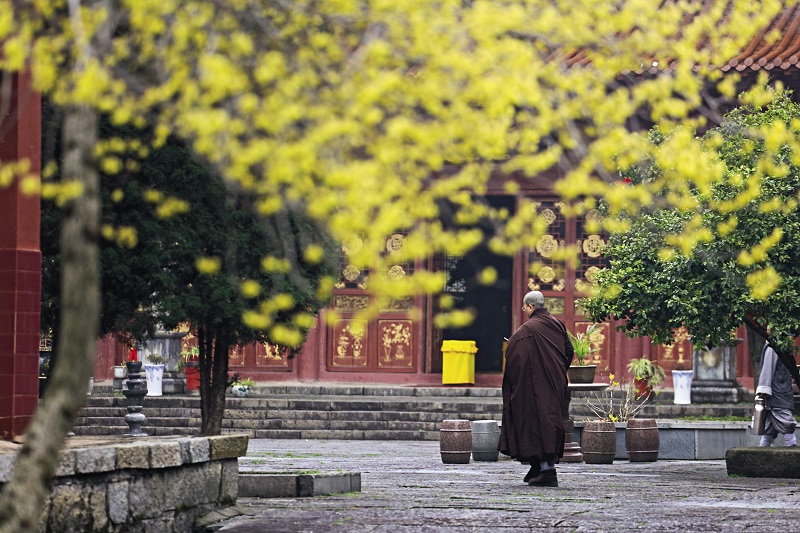Located in Jiujiang City of China’s southeastern Province of Jiangxi is the stunning Lushan Mountain Scenic Area adjacent to the country’s largest freshwater lake Poyang in the east and the Yangtze River in the north. It spans an area of 302 square kilometers and its average elevation is about 1,200 meters above sea level.
In 1982, Lushan was one of the first national scenic areas set up in China; in 1996, it was listed as a World Cultural Heritage Site; in 2004, it became one of the first members of the World Geopark Network; and in 2013, it was named a national nature reserve.
This mountain area is home to a host of natural landscapes such as springs, ravines, lakes, and hills. Its peaks are often immersed in a charming sea of clouds. In addition, the scenic area boasts of numerous historical treasures. Here, humanistic culture and natural beauty are unseperable, making the mountain a one-of-a-kind sacred place of humanities.

Two lucky tourists in Lushan are enjoying the stunning view of the cloud waterfall on January 6, 2022.
The Spectacular Scenery of Water and Peaks
One of the unique landscapes of Lushan is the Five-Old-Men Peak located in the southeast of Lushan. As its tip is severed by a mountain pass and therefore divided into five parts side by side, it has the appearance of five old men sitting on the ground, hence the name. The southeast side of the peak consists of steep cliffs, while the terrain of its northwest slop is much more hiking-friendly, so visitors can clamber up the path of steps leading to the top if they are physically fit or enjoy a cable car ride if they are not physically fit enough. Arriving at the top, visitors will discover that they are standing on a giant cliff. Looking down from the top, they can enjoy a breath-taking view of rolling hills as if they are surrounded by a turbulent sea. At the foot of the mountain is the calm Poyang Lake sitting quietly like a mirror, and the outline of the city lying in the distance also can be spotted from the peak.
When there is a sea of clouds, visitors may feel like they are riding the clouds and roaming in a heavenly fairyland. When surrounded by white clouds on every side, everything is shrouded in the misty fog, the scenery from below disappears, and even the trees on the top are buried beneath the clouds. It is a celestial and bizarre scene. By contrast, when the sky is clear, the Poyang Lake looks like a huge mirror, reflecting discernible shadows of the boats sailing on the water.
There is a saying that “one will not ever be considered a visitor to Lushan if he or she has not been to the three-tier waterfall.” The waterfall located not far below the Five-Old-Men Peak is known as the greatest wonder of Lushan, or the most worth visiting scenic spot at Lushan. The flying water covers a span of 155 meters and is divided into three parts by the three-tiered cliff that it traverses while making its way down. Each tier of the waterfall is distinguishable from the others. The first tier rushes down vertically for more than 20 meters from the top, the second tier takes a detour at a curve which is followed by the third tier falling directly into an emerald green lake at the bottom.
Since its discovery in the Southern Song Dynasty (1127-1279), many literati and celebrated figures of different dynasties traveled to the waterfall to get a glimpse of the natural beautiful scenery and left a number of literal masterpieces.
Another must-visit spot not far from the Five-Old-Men Peak is Hanpo Pass. West to it is the famous ice peak called “Plowshare Tip” as its sharp-pointed tip resembles a plowshare. Opposite to it is the highest peak of Lushan Mountain called “Hanyang Peak,” and at its base lies the Poyang Lake where the mountain and water create a fascinating landscape.
The ornate Wangpo Pavilion, sitting on the Hanpo Hill, has been recognized as the best place to watch the sunrise. Many visitors go there to wait for one or two hours in order to observe the sun rise. When there’s a sea of clouds, the white clouds exhibit shades of gold and red in the sunlight; when the sky is clear, Poyang Lake can be seen from the pavillion, and visitors can watch the sun rising up over the horizon and shining on the lake.
After watching the sunrise, visitors can also follow the path down the hill from Wangpo Pavilion to visit the oldest botanical garden in China called Lushan Botanical Garden. It is the first botanical garden used to conduct plant research in China. There are 17 specialized parks distributed throughout the reserve with more than 5,500 species of relocated and conserved plants, 157 of which are rare and endangered plants. Of the 600 kinds of pine and cypress plants in the world, more than 240 types can be found here, thus making it known as China and the world’s living specimen garden of pine, cypress, fir, and juniper trees. With these significant strengths in biological protection, Lushan Botanical Garden is regarded as an important biodiversity conservation base in China.

Lushan is covered in snow on February 9, 2022.
Taoist Sacred Land
In the west of the Lushan scenic area, there is a long valley extending around 1.5 kilometers in length, which was opened in the 1980s and is now a famous attraction – the Brocade Valley. According to legend, the famous monk Huiyuan of the Eastern Jin Dynasty (317-420) used to pick flowers and collect herbs in this valley. Here, when the flowers are in bloom, the valley looks like a brocade, resembling an intoxicating scroll along the way through the valley.
The Immortal’s Cavern is a popular attraction in the Brocade Valley. This is a holy place of Taoism, where Lü Dongbin, one of the legendary Eight Immortals of Taoism, is said to have practiced and become an immortal. Well preserved cliff carvings from different dynasties and inscriptions on the rocks remain vivid and clear for visitors to see. The Immortal’s Cavern is a natural cave with a height of seven meters and a depth of about 14 meters. Deep in the cave there are two springs whose water drips into the natural stone cellar making tinkling sounds that are pleasant to hear.
Lushan’s secluded natural landscape has been favored by numerous literati, monks, and Taoists since ancient times. During the Eastern Jin Dynasty, Wang Xizhi found a retreat in the Lushan Mountain; the famous monk Huiyuan built the Dongling Temple, and then over the next 1,600 years, nearly 700 temples were built. Following the first Taoist temple that was constructed by the noted Taoist Lu Xiujing of the Northern and Southern Dynasties (420-589), 18 Taoist temples were built one after another; and during its peak period there were as many as 3,000 Taoist priests practicing within the temple walls.
The White Deer Cave Academy, originally established in the Southern Tang period (937-975), flourished for more than 1,000 years until the Qing Dynasty (1644-1911). In its heyday, there were more than 500 students studying there.

An “aerial cafe” built on a glass pedestrian walkway offers the bravehearted a thrilling walking and drinking experience.
Sea of Clouds, Cloud Waterfall
In 2022, the China Meteorological Service Association announced the first 15 “weather and climate landscape viewing places” in China, and Lushan was listed for its sea of clouds.
Lushan’s spectacular sea of clouds is well worth the view. The formation of this amazing creation of nature is caused by the weather changes in the region. The area is covered with lush vegetation, surrounded by the Poyang Lake and Yangtze River and has an abundant amount of rain and fog. These geological features, when combined together, form a typical stratocumulus cloud formation, which is most common in Lushan, especially when cold air moving southward meets warm air at the Yangtze River Basin.
According to meteorological observation records, Lushan has about 200 foggy days every year on average, concentrating between May and September. The best time to view the landscape is when the sky clears up after rain.
Besides the sea of clouds, some lucky tourists can also witness a rare view of a cloud waterfall. Thick white clouds climbing up over the top of the mountain and swooping down into the valley floor appear like raging sea waves rushing forward. This scene has also attracted many photographers to come to the top of the mountain to set up their cameras and then wait to capture the marvelous scene with their lenses.

A monk is going about his daily duties at the thousand-year-old Xilin Temple in Lushan.
Witness of History
Lushan has witnessed many important historical events during the late 19th century and the early and middle 20th century.
During the last few decades of the Qing Dynasty, around 2,840 missionaries and businessmen from 17 countries went and stayed in Lushan Mountain. At that time, many villas were built to meet the needs of living accommodations. In 1905, the number of newly-built western-styled villas reached 147, and in 1927 that number amounted to 712, making Lushan a popular summer resort for visitors from home and abroad.
In the 20th century, Lushan also witnessed many key moments in China’s contemporary history. During the time of the Republic of China (1912-1949), It became the summer resort for the National Government and thus was called the “Summer Capital.” In the summer of 1937, Zhou Enlai made two visits to Lushan to negotiate with Chiang Kai-shek. Their constructive talks led to the epic cooperation between Kuomintang and the Communist Party of China against Japan’s invasion, making China one of the major anti-fascist battlefields in the world. Lushan also hosted three important conferences of the Central Committee of the Communist Party of China in 1959, 1960, and 1970 respectively. And in 1959 and 1961, Chairman Mao Zedong wrote two poems dedicated to the majestic beauty, time-honored history, and rich culture of Lushan.
Lushan has been tied to the beliefs, historical events, and people that have had a significant influence on China’s history. Today, visitors can visit the renovated White Deer Cave Academy, the well-preserved former residences of famous people and the old site of the Lushan Conferences.
Chinese people have always revered nature and loved natural landscapes. Generations of literati went to admire the beauty of Lushan, took inspiration from the local natural beauty, and created a large number of literary works which later proved to be valuable humanistic wealth. At the same time, Lushan recorded China’s history while witnessing generations of people moving forward.